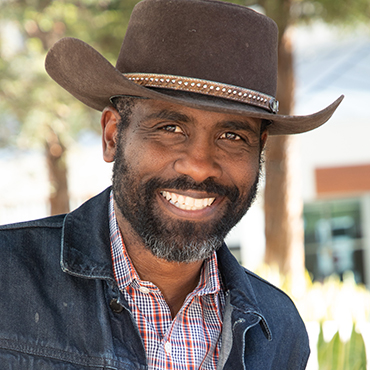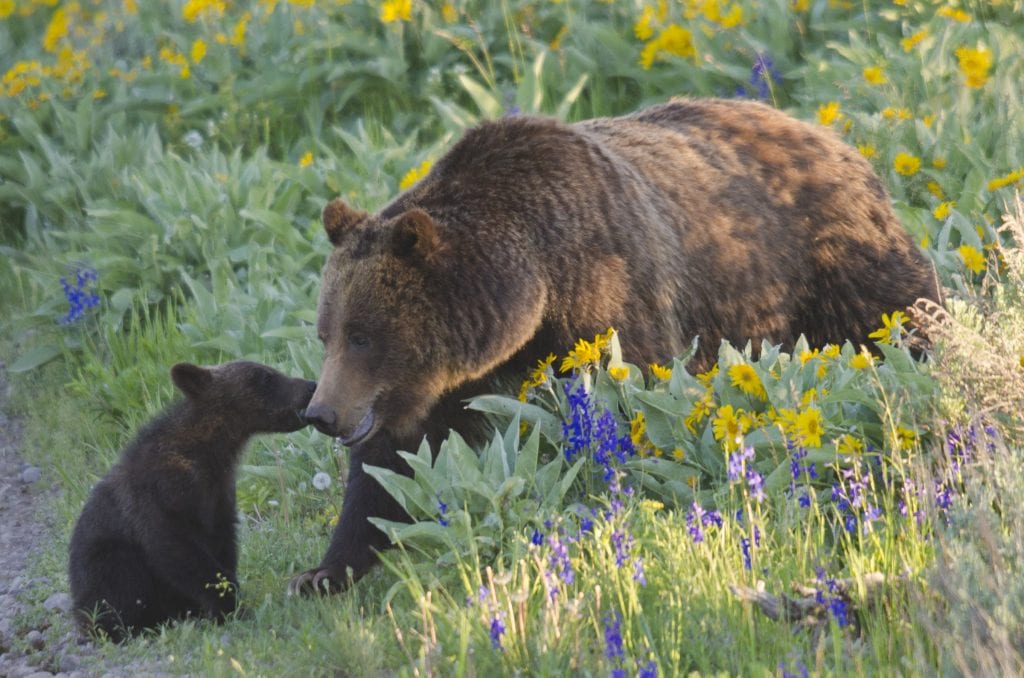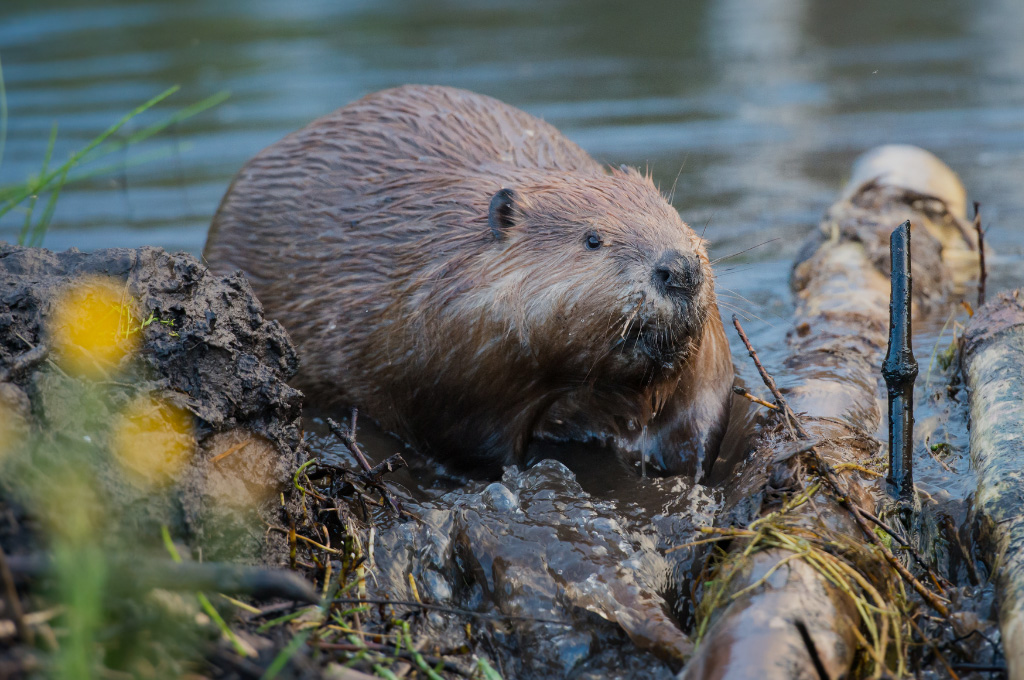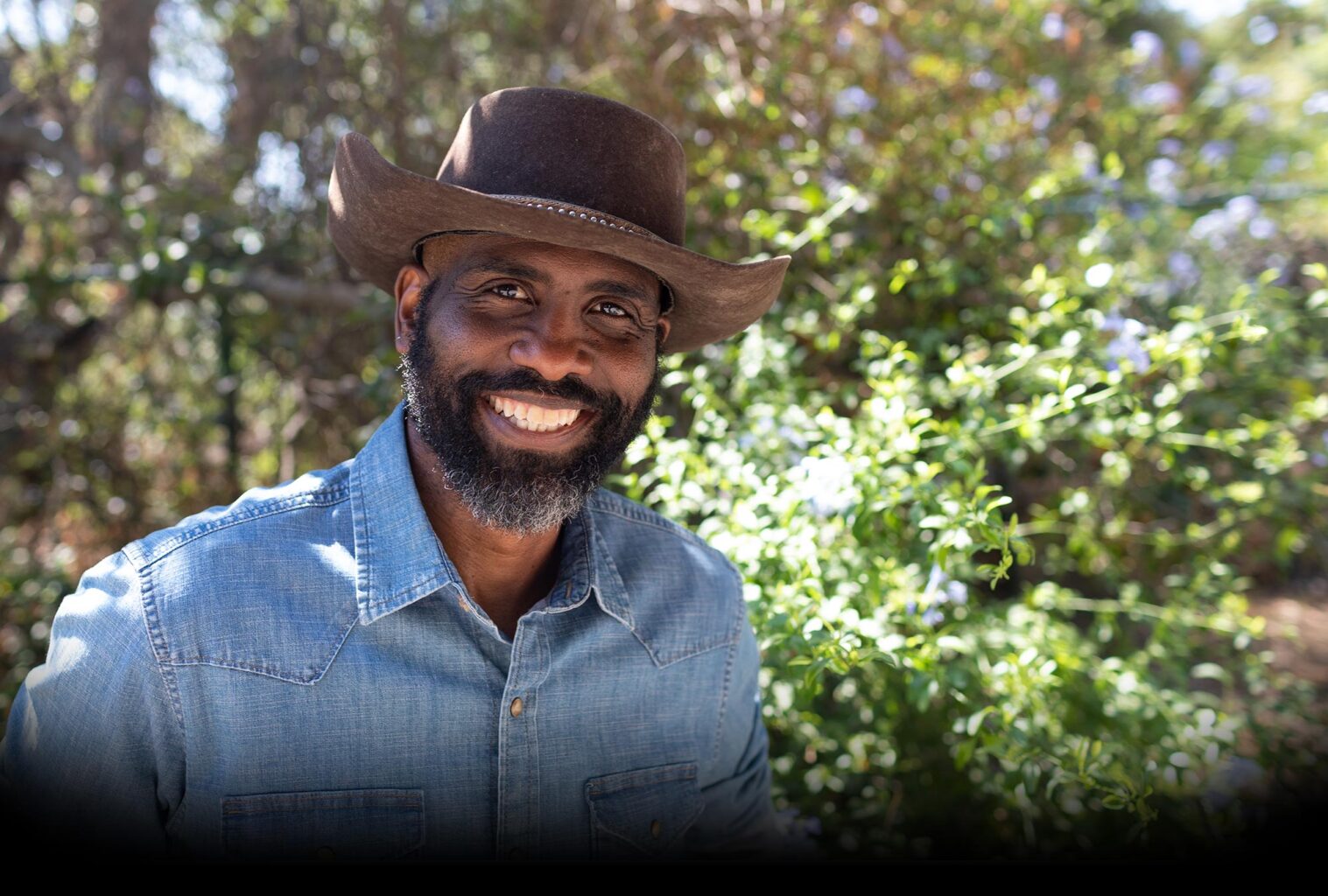WildEarth Guardians is thrilled to welcome Hop Hopkins as the organization’s new Executive Director! With a deep love of the wild and a fierce dedication to the communities and wild nature of the West, Hop is a trailblazer for Guardians’ future.

WildEarth Guardians’ new Executive Director, Hop Hopkins.
After an exhaustive national search, the board and staff of WildEarth Guardians unanimously chose Hop to lead the organization. Hop was born in Texas, has lived across the West, and has been organizing for over 25 years at the intersections of race, class, gender, and the environment.
Previous to serving as Executive Director at WildEarth Guardians, Hop led organizational transformation at the Sierra Club, managed LA River Keepers, and helped start an outdoor education school for children and families. He has been a leader in movements from HIV/AIDS to global justice, food sovereignty, anti-displacement, and the clean energy transition.
We put some questions to Hop to help him introduce himself—take a look. We’re so excited to welcome Hop to Guardians, and we think you will be too!
Why did you want to be executive director of WildEarth Guardians?
HH: Guardians stands as a beacon of hope and action in the realm of conservation. Guardians is unapologetic and uncompromising in its defense of the West’s majestic landscapes, magnificent wildlife, fragile climate, and dynamic river systems. For many years I have admired its bold systems-change approach to championing innovative environmental policies driven by grassroots engagement, and cutting-edge use of legal tools to hold decision-makers accountable.
Guardians does what others say “can’t” be done, and that’s the same cloth from which I’m cut—challenging the status quo, strategically going after what the planet and people really need, and steering clear of false solutions. In other words, Guardians like to kick ass and so do I!
I’m here, as I believe I’ve always done, to join shoulder-to-shoulder with those who use their privilege to partner with, and elevate, the voices of the voiceless—this includes those who have no human voice but their cries scream for justice and equity. I’m here because I want to work with the Guardians community and strategize how to strike the biggest blow against those who seek to continue harmful extractive policies and practices against the people and wildlife of the West. I‘m a Guardian because I want to win for the planet.
What are your immediate priorities as Executive Director?
HH: I’m incredibly excited to build off Guardians’ dynamic history, so for the first few months I’ll be focused on two things:
- Getting to know and be known by our brilliant staff and key supporters, and getting up to speed on the work of our conservation programs.
- Organizing a strategic planning summit with staff, board, and possibly a few key supporters for the purposes of team building, processing the leadership transition, community power mapping, and capturing it in an actionable multi-year strategic plan.
Building community internally and reaching strategic alignment early will enhance our ability to build power and move with shared purpose for the wild and our communities, which will be absolutely critical this election year and beyond.
What direction are you hoping to take Guardians?
HH: My first order of business is to begin here at home with the patient process of “moving at the speed of trust.” The strength of our community is essential to our future success. The victories we achieve—defending at-risk species and the laws like the Endangered Species Act that protect them, ending the cruel slaughter of wildlife on our public lands via traps, poisons, snares, and killing contests, and championing a world for all to coexist alongside native carnivores such as grizzly bears and gray wolves—are only possible because of the relationships Guardians has built with our members, our generous donors, and grassroots communities across the West.

Grizzly bear and cub in a field of wildflowers. Credit: Sam Parks.
That is the direction I’m headed—deeper into the network of passionate Western advocates and Guardians. To get where we’re going, I will be a faithful steward of the work and relationships that have built Guardians’ power, and at the same time, build a bigger table to creatively and strategically expand and deepen Guardians’ community. I’m looking to bring a deeper intersectional approach to how we protect the wild future of the West.
What drives you?
HH: Questions drive me. I find value in pausing, reflecting, and being curious. The patient practice of inquiry has led me to interrogate and challenge my assumptions, and those that the status quo places before me as so-called certain truth. Right now, I’m driven by the question: “How do we build a more powerful and inclusive environmental movement that is aligned with the progressive wings of the climate and environmental justice movements centering on solidarity and not charity? In other words, how do we build a bigger table?”
Why is it important to “build a bigger table,” so to speak?
HH: To win the current and future fights we take on as Guardians, it will be important to engage as many new underrepresented (not uninvolved) voices in our unapologetic and uncompromising fight to save the West. After all, the same exploitative belief systems destroying ecosystems and wildlife habitat are the same forces (colonialism, capitalism, racism, sexism, etc…) sacrificing frontline communities. The bigger table—also known as the “Bigger “We”—is the multiracial, intergenerational, pro-democracy, cross-class, anti-racist movement of individuals, activists, organizers, and everyday people within our communities.
As the climate crisis becomes more acute and more economies and democracies swing in the balance, people will inevitably become more pessimistic. We cannot succumb to that. Having a multi-generational vision and plan provides hope, and this belief in a better future will be our north star.
At Guardians, we need to be about building more on-ramps for people who care about the future of the West’s wild nature and want to stand in solidarity with frontline communities to join our cause and strengthen our efforts to protect and restore the wildlife, wild places, climate and health of the American West. And, as I said, we need hundreds of thousands of people to raise their voices to secure the wins that match the moment we’re in. The strongest way to build scale is through collaboration, cooperation, and true solidarity.
What gives you hope we can do that?
HH: Can you imagine being in a cotton field in Texas looking through stinging sweat at your parents, at your grandparents, and then across from you at your children and knowing that your grandchildren were going to be born into slavery? Yet, you had to persevere. But for what? For hope that one day, someday someone in your lineage, that you will probably never know, will be free. It hurts my soul to even think of what my ancestors endured. And, yet, here I am. I am that someone. I am that someone who made it into that future. I’m made of the same stardust that made them and it is my duty to fight on until victory is won.
I have hope that WE, both at Guardians and in the movement-at-large, can fight on like that. There’s very little that I can do, or have done, alone. We are individual beautiful parts of an even more immaculate system all nestled on a rock hurtling through space that is part of another majestic system of systems. When I think about that, any idea that I can make things happen in isolation goes right out the window.
BUT if we can create the conditions conducive for developing an enduring conservation vision that is community-led, inclusive, and life-affirming, we can build a movement of millions.
How would a good friend describe you?
HH: Hmmm…that’s an insightful question. Let me try to give an equally insightful answer… Well, a good friend once said I was “a whole lotta country and a little bit ghetto.” I took it as the compliment it was meant to be and I should have already put it on a t-shirt!
More to your point, I think I would be described the same by those who like me and those that feel challenged by my presence. Folks would say I am even-keeled, emotionally intelligent, and morally conscious of the ends as well as the means. I am “little d” democratic and anti-authoritarian by nature, strategically sharp, constantly curious, and consistently humorous.
Do you have a favorite wildlife species?
HH: Oh, that’s easy! I’ll give you four wildlife species—grizzly bears, octopuses, sage grouse, and beavers, of course.

A beaver emerges from the water. Credit: Jillian Cooper
You wrote an article titled Racism is Killing the Planet. Can you explain the premise?
HH: Yes, I really appreciate you asking this question. In the article, I argue that racism makes possible the creation of “sacrifice zones,” places where toxic waste and poisonous emissions are allowed to be sited because they only harm BIPOC and working poor/working class communities. The main idea of the article is:
“You can’t have climate change without sacrifice zones and you can’t have sacrifice zones without disposable people, and you can’t have disposable people without racism.”
I’ve come to understand the ideology of extraction and its supporting ideas of domination, sacrifice, and disposability must change and give way to the concept of regeneration. Climate change is a global reckoning driven by colliding and compounding health, ecological, and economic crises. When these crises are examined in their totality, it exposes chronic and historic inequities, systemic in nature, purposely designed to impact voiceless people and nature. Well, the cumulative result of this extractive ideology has finally caught up with everyone and the entire planet, hence climate change.
This idea is not new to black, indigenous, and other people of color in the climate and environmental justice movements. However, it was new to those in the conservation and environmental movements. In the article, I take the idea further by historically situating the origin of the ideology in the Doctrine of Discovery. The last part of my argument makes the case that we will never survive the climate crisis without ending white supremacy. The battle for racial justice and environmental justice are inextricably linked, and the best chance the environmental movement has is to fight alongside the racial justice movement.
There are similar ideas contained in the organization’s 2021 Strategic Vision about the colonization of the West and the exploitation of land and communities by the fossil fuel industry.
I intended it to be a thought-provoking article and I hope the Guardians community engages with it.
What does it mean for you to be doing this work in the West?
HH: First, it means that I acknowledge, as does WildEarth Guardians, that we occupy the traditional lands of Indigenous Peoples who are the original stewards of the place we call North America today. We honor the diverse and vibrant cultures, languages, sciences, knowledge, and histories of the Indigenous Peoples who have called this land home for eons. We commit to continue learning about and addressing the impacts of settler colonialism on Indigenous peoples, Black people, other People of Color, and working poor and working class communities. We will work to center the perspectives, voices, and needs of Indigenous communities in our litigation, policy advocacy, and organizing.
What do you do in your free time?
HH: We live on a small piece of land with a small food forest, honey bees, chickens, and multiple compost piles. It has transformed over the years from grass fields to a thriving haven for all manner of critters coming and going. It has been a place where my family has spent many hours working, picking berries, fruits and vegetables, playing hide and seek, hosting potlucks, and just chilling out. I like spending time outside making compost—I really like making compost!
I also like hiking with my wife, walking our two cattle dogs, taking road trips, and reading. Right now I’m reading Begin the World Over, a dog-eared copy of True West gifted to me by the author (Guardians board president Betsy Gaines Quammen), and just finished The Marrow Thieves and The Ministry of the Future. The last two I read with my daughters. Waiting in the wings is an anthology of Black nature writers called A Darker Wilderness.
What can those reading this do to help the mission of WildEarth Guardians?
HH: I’m glad to wrap up our time together with this question because an organizer worth their salt always, always leaves the room with a call to action!
I’d like to ask you to do two things:
- We want you to continue supporting WildEarth Guardians and become a member if you aren’t already! Your donation helps us fight for the protections wildlife and wild places need, advocate for climate action, and stand with or support frontline communities’ fight against oil and gas companies that are polluting their air and water. We’ve earned the highest four star rating from Charity Navigator, so you know your donation will be used effectively.
- Please go to our Action Page and add your voice to petitions and comments we send to natural resource agencies, Congress, and the White House to improve protections for nature. The U.S. Fish and Wildlife Service, Environmental Protection Agency, U.S. Forest Service, and numerous other federal agencies all have processes that we can influence to get better outcomes for people and nature—so go and raise your voice!
Also, feel free to get in touch! Please reach out to me or our staff for questions and suggestions. Great ideas come from all corners!
The world of tomorrow is being built on what we protect and defend today. We’re standing together as Guardians to do our part and I invite you to join us.
